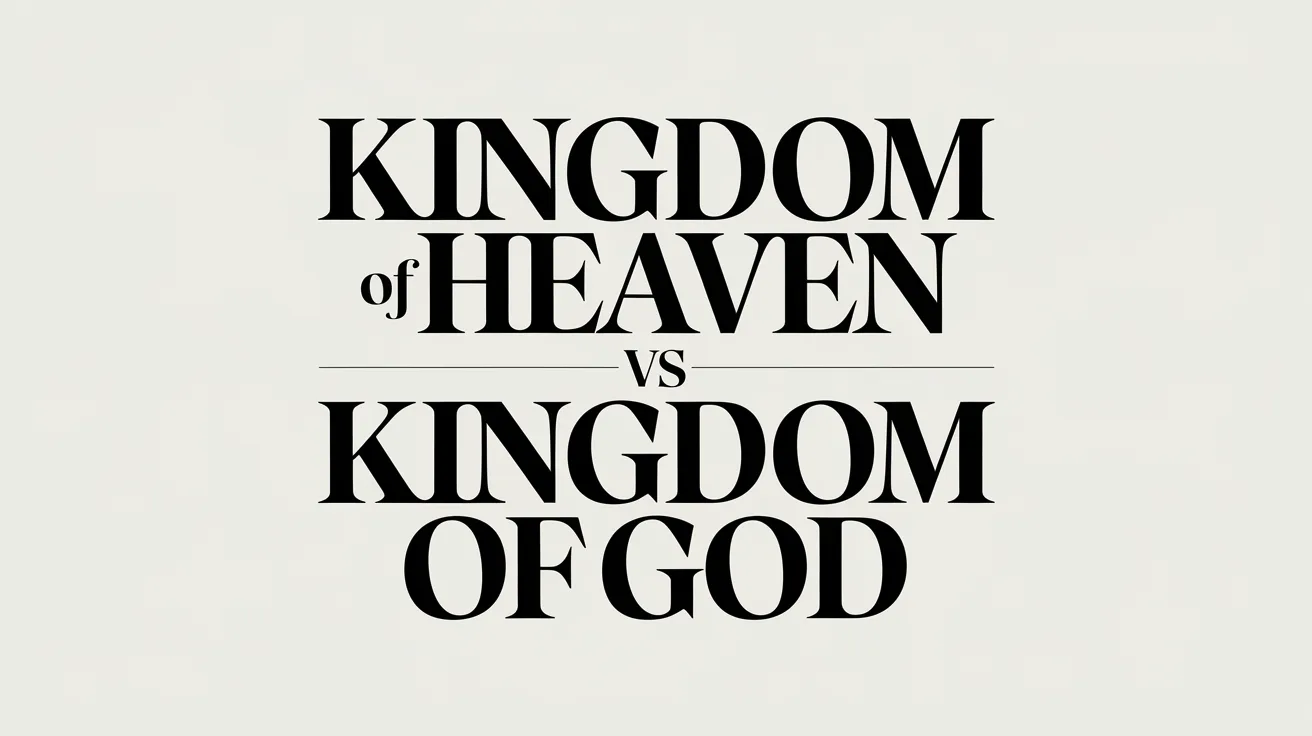The phrases “Kingdom of Heaven” and “Kingdom of God” are central to Jesus’ teachings in the Gospels and have sparked significant theological discussion over their meanings and distinctions. While many believe these terms are interchangeable, a closer examination reveals nuances that may suggest otherwise. In this study, we will explore what the Bible says about the “Kingdom of Heaven” and the “Kingdom of God,” why Matthew uniquely uses “Kingdom of Heaven,” and whether these phrases ultimately mean the same thing or convey different aspects of God’s rule.
The Kingdom of Heaven: Matthew’s Unique Phrase
The term “Kingdom of Heaven” is used exclusively in the Gospel of Matthew, appearing over 30 times. This has led scholars to question why Matthew chose this phrase instead of the more common “Kingdom of God” used in the other Synoptic Gospels (Mark, Luke). To understand the significance, it is essential to consider Matthew’s audience and purpose.
Matthew’s Gospel was primarily directed at a Jewish audience. Jews of that time had a deep reverence for God’s name and often avoided saying “God” directly to prevent taking His name in vain (Exodus 20:7). Instead, they would use substitutions such as “Heaven” to refer to God. This practice is known as a reverential circumlocution. By using the term “Kingdom of Heaven,” Matthew could have been aligning his language with Jewish sensibilities, making his message more culturally appropriate without diminishing its divine meaning (although Matthew does use the phrase “Kingdom of God” a few times).
The Kingdom of God: A Broader Use
The phrase “Kingdom of God” appears throughout the Gospels of Mark, Luke, and John, as well as in Paul’s epistles. It emphasizes God’s sovereign rule over all creation and His redemptive reign in the hearts of believers. For example, Jesus proclaimed in Mark 1:15, “The time is fulfilled, and the kingdom of God is at hand. Repent, and believe in the gospel.” This statement underscores the nearness and immediacy of God’s reign through Jesus’ ministry.
Luke 17:21 further deepens our understanding, as Jesus says, “The kingdom of God is within you.” This points to the spiritual reality of God’s kingdom manifesting in the lives of those who believe and follow Him, indicating that it is not only a future physical realm but also a present, internal experience.
Are the Kingdom of Heaven and the Kingdom of God the Same?
To determine if these terms are synonymous or distinct, it is crucial to compare how they are used in context. Some examples demons/”>demonstrate that “Kingdom of Heaven” and “Kingdom of God” can be used interchangeably:
- The Parable of the Mustard Seed:
- “The kingdom of heaven is like a mustard seed, which a man took and sowed in his field” (Matthew 13:31).
- “It is like a mustard seed, which a man took and put in his garden” (Luke 13:19).
These accounts use the same parable but employ different terminology, suggesting that “Kingdom of Heaven” and “Kingdom of God” convey the same principle of God’s expanding rule.
- Jesus’ Teachings on Wealth:
- “Assuredly, I say to you that it is hard for a rich man to enter the kingdom of heaven” (Matthew 19:23).
- “How hard it is for those who have riches to enter the kingdom of God!” (Mark 10:24).
In this parallel teaching, Jesus uses both terms to communicate the same concept: the difficulty of entering God’s rule when wealth is prioritized over spiritual matters.
Theological Interpretations: Subtle Differences
While these examples support the idea that the “Kingdom of Heaven” and “Kingdom of God” can be synonymous, some theologians argue that there are subtle distinctions:
- Scope of Meaning:
- The “Kingdom of God” is seen as a broader term encompassing God’s sovereign rule over the entire universe, including His moral and redemptive reign.
- The “Kingdom of Heaven” may emphasize the aspect of God’s kingdom that relates more specifically to the promised Messianic rule, which would have resonated with Matthew’s Jewish audience as they anticipated a future earthly kingdom led by the Messiah.
- Heavenly and Earthly Aspects: Some scholars believe that “Kingdom of Heaven” could highlight the heavenly origin of God’s kingdom and its eventual full manifestation on earth, as seen in prophecies like Daniel 2:44: “And in the days of these kings the God of heaven will set up a kingdom which shall never be destroyed.” This interpretation aligns with the Jewish expectation of a divinely established earthly kingdom.
Why Does Matthew Use Both Terms?
Although Matthew predominantly uses “Kingdom of Heaven,” he does reference the “Kingdom of God” in a few instances. For example, in Matthew 12:28, Jesus says, “But if I cast out demons by the Spirit of God, surely the kingdom of God has come upon you.” This verse is significant because it indicates the present reality of God’s kingdom breaking into the world through Jesus’ works.
Matthew’s choice to use both terms suggests that he saw them as related but nuanced. When referring to God’s overarching, divine rule manifest in Jesus’ ministry and power, he may have found “Kingdom of God” appropriate. When addressing the expected Messianic fulfillment and God’s sovereign plan that aligned with Jewish anticipation, “Kingdom of Heaven” could have been used to maintain cultural sensitivity and theological emphasis.
Kingdom Characteristics: Present and Future
One important aspect of understanding these terms is recognizing the dual nature of God’s kingdom: it is both “already” and “not yet.” The kingdom is present wherever God’s rule is acknowledged and His will is done (Luke 17:21); however, it is also a future reality that will be fully realized when Christ returns and establishes His reign (Revelation 11:15).
Matthew 6:10 the model prayer reflects this tension: “Your kingdom come. Your will be done on earth as it is in heaven.” Here, Jesus teaches that while God’s kingdom has come in part through His ministry and continues through the work of the Holy Spirit, there is an anticipation for its complete fulfillment.
How Should Believers Understand and Live in the Kingdom?
Whether one reads “Kingdom of Heaven” or “Kingdom of God,” the implications for believers remain powerful and life-altering. The kingdom calls for repentance (Matthew 4:17), embodies righteousness (Romans 14:17), and requires prioritizing God’s reign over earthly pursuits (Matthew 6:33). Born-again believers are part of this kingdom now and are called to live as citizens reflecting its values.
The parables of Jesus, particularly in Matthew 13, offer insights into the nature of the kingdom: it grows from small beginnings, it is of immeasurable value, and it will reach its ultimate fulfillment at the end of the age. As participants in the kingdom, believers are to spread its message and live under the guidance and power of the King, Jesus Christ.
My Final Thoughts
While there is strong evidence that “Kingdom of Heaven” and “Kingdom of God” are often used interchangeably, the nuances in Matthew’s Gospel highlight different aspects of God’s rule. “Kingdom of Heaven” may underscore the kingdom’s divine origin and connection to Jewish Messianic expectations, while “Kingdom of God” conveys God’s comprehensive rule over all creation and His redemptive work.
Ultimately, both terms point to the same profound reality: God’s sovereign reign that begins in the hearts of believers and extends to a future fulfillment when Jesus returns. For Christians, this kingdom is not only a hope for the future but a present calling to live under the rule and grace of the Prince of Peace, who embodies and brings God’s kingdom to earth.





 Get the book that teaches you how to evangelize and disarm doctrines from every single major cult group today.
Get the book that teaches you how to evangelize and disarm doctrines from every single major cult group today.